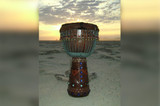Starting a Drum Circle in Four Steps
 For some drummers, little is more exciting than drumming amongst a group of other musicians. For people interested in starting your own drum circle, it can be surprisingly easy. It can also be ridiculously challenging, depending upon your community. There are, however, some things you can do to get your drum circle going, inviting into your life opportunities and musicianship the likes of which you’ve only dreamed.
For some drummers, little is more exciting than drumming amongst a group of other musicians. For people interested in starting your own drum circle, it can be surprisingly easy. It can also be ridiculously challenging, depending upon your community. There are, however, some things you can do to get your drum circle going, inviting into your life opportunities and musicianship the likes of which you’ve only dreamed.
1. Reach Out. Tell everyone you know that you want to start a drum circle and you may be surprised by the enthusiasm generated. Plenty of people have heard of drum circles and wanted to participate in one, but never knew where to look. Post in online communities and social networks, letting people know they are free to share the information with others. Post notices in coffee shops. You may want to reach out to others prior to finding a location if you aren’t sure how receptive your immediate community will be to this idea.
2. Choose a Location. You want to choose a spot that is likely to be available every time you want it. Usually, public places like beaches, community centers, and parks are good choices. Open, public venues make it more likely that others may wander over to join after hearing the beautiful music you and your circle create. When starting your own drum circle, you want to take into consideration comfort levels and visibility. Of course, once all the drummers get going, it would be difficult to hide the source of the commotion, but out of respect for the variety of people you hope to attract, it is a good idea to pick a location that isn’t too far from the viewing public.
3. Relax. People usually participate in drum circles simply because they like drumming or playing another percussion instrument. This isn’t the time to try to start a band or become a band leader. Commit to enjoying yourself and encouraging others to do the same. When you are starting your own drum circle, you want to seem approachable, so relax and concentrate on having a good time.
4. Lead Well. Good leaders know how to sit back and let others take the reins. This is definitely a quality you want to practice when looking to start your own drum circle, because it’s important that everyone who participates feels welcome. When there are lulls in the energy or music, of course be willing to start up a rhythm and keep it going, but also keep an ear out for opportunities to follow along with the other percussionists.

By following these tips, you are likely to enjoy your drum circle experience and possibly make a few friends.
Recent Posts
-
What is the Best Size Djembe for Beginners?
If you're new to the world of percussion and interested in learning the djembe, you're in for a t …16th Jul 2024 -
The Benefits of Becoming a Drumming Teacher: Transforming Passion into Profession
Why become a drumming teacher? Becoming a drumming teacher is an excellent way to share your pas …22nd May 2024 -
What Makes the Djembe Drum a Spiritual Instrument in African Music?
Origin and history of the Djembe drum The Djembe drum originates from West Africa and holds sign …16th May 2024



